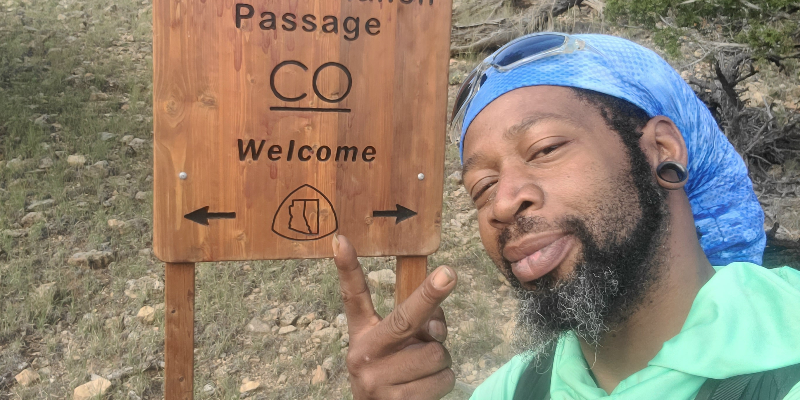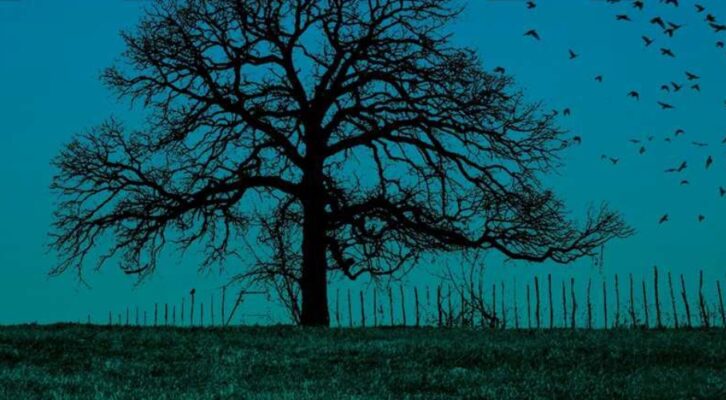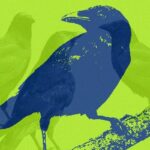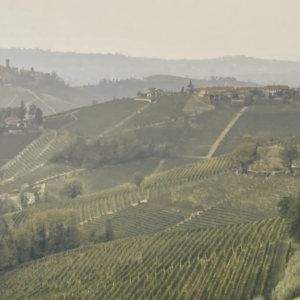
Akuna Robinson on Going the Distance
In Conversation with V.V. Ganeshananthan and Matt Gallagher on Fiction/Non/Fiction
With summer approaching, Army veteran and long-distance hiker Akuna Robinson joins host V.V. Ganeshananthan and guest co-host Matt Gallagher to talk about the experience of through hiking, or long-distance hiking a trail from end to end. Robinson, the first Black man to complete the Pacific Crest Trail, the Appalachian Trail, and the Continental Divide Trail—the Triple Crown of through hiking—recounts how he was inspired by the movie Wild to attempt the Pacific Crest Trail as a way of managing post-traumatic stress disorder from his military service in Iraq. Robinson reflects on encountering greater diversity on the trail in recent years, seeing the landscape affected by climate change, and the individualized nature of packing for a months-long journey. He also discusses hiking with Gallagher, and reading and writing on the trail. Gallagher reads from his 2021 ESPN profile of Robinson.
Check out video excerpts from our interviews at Lit Hub’s Virtual Book Channel, Fiction/Non/Fiction’s YouTube Channel, and our website. This episode of the podcast was produced by Anne Kniggendorf.
*
From the episode:
V.V. Ganeshananthan: Akuna, you’ve been hiking for eight years now, and that piece came out in 2021. So, you’re looking back on all this with a different perspective. You started hiking before the pandemic, returned to hiking after the worst of COVID, and you finished the Triple Crown. What effect has it had on your mental health to spend this much time in nature with this level of intensity? What are some of the most beautiful and unusual things you’ve seen?
Akuna Robinson: As far as my mental health goes, PTSD isn’t something to vanquish. I think that’s a big misconception people have. They believe that going out and hiking cured me. I still struggle with a lot of the same things I did, but I’m better equipped to manage it now. Just being able to take time for me to feel like I’m accomplishing things, I’m part of something. Having time to work things out in my own mind, and in my own time, has helped me manage PTSD, and the symptoms that come with it, better than I could have ever imagined.
As far as the other part, one of the most beautiful things I think I’ve ever seen hiking was on the Continental Divide Trail in 2019. I was in Colorado with my partner, and we’d just had a very long day, so we started to take a break at a lake. For maybe six or 700 miles we were talking about how we would love to see a moose. We had seen prints scattered everywhere. My partner, she’s also a triple-crowner, and we’ve hiked thousands and thousands of miles never seeing a moose. But, we’re just sitting at this lake, having a conversation, when out of the mist a moose just walks out of the woods, goes to the water, bends to drink, and just looks at us for a while. After about five minutes, it kind of just disappeared as quick as it appeared. I think that was one of the most beautiful things I’ve ever seen out on a trail.
VVG: It’s interesting to hear you measure time in miles. “Six or 700 miles.” How much time is that?
AR: I have a bad habit of doing that. If I’m with my partner I average three to four miles an hour, and if I’m by myself, I can kick that up to five to six pretty easily.
VVG: That’s a day-long conversation that you’re talking about?
AR: As you know, at most of these sites, we average about 20 to 25 miles a day. So, there are whole days’ worth of conversations that can be had, and we don’t always hike together, so we get to tell each other stories, and who we ran into during different pit stops along the way.
VVG: As you can hear from my reactions to a lot of what both of you were sharing, I am not that familiar with this trade. I am not a naturally outdoorsy person. I moved to Minneapolis in the fall of 2015, and a lot of people here are outdoorsy, so I’ve become more outdoorsy over the years, but it’s still not my instinct. You have made it one of your missions to share this deep enjoyment and mental peace with people who aren’t historically involved in this space, for example, veterans, people of color, and anyone who just doesn’t feel that they belong. I’m basically your target audience and way more of a beginner than Sir Doodle, Matt’s trail name.
In that article, Matt describes himself as the standard idiot writer who overpacked; I would certainly also be that person. I’m kind of in awe of the outdoors, also vaguely afraid of it and aware of my own tendency to klutziness. As Matt wrote, the Pacific Crest Trail Association recommends north-bound hikers begin mid-April through early May, so I’m already late to change my life in this way. What advice would you give people like me, the aspiring outdoorsy people, about hiking and camping this summer?
AR: The best advice I could give anyone that’s trying to get into hiking, camping, and long-distance hiking, is any fear or concerns you have, regardless of what you’re seeing on the internet, it is a legitimate thing. Matt says he overpacks, but his overpacking makes him comfortable, and that’s the happy medium you need to find—that level of comfortability. Some people, like me, like to be out in the back country where there’s nothing around for miles. There’s no city, no civilization, no people. But for other people, that might not make them comfortable. Hiking your local trail that’s 20 minutes down the road from you, if that is your comfort zone, then go for it.
VVG: Can you guys talk a little bit more about the overpacking? I’m curious about what that means. How much weight are you carrying?
Matt Gallagher: That’s a great question because Akuna has it down to a science. You’re down to what? Seven or eight pounds?
AR: I have food and water for, say, five or six days. I’m a little under 30 pounds.
MG: It makes a tremendous difference. I overpack. I was too concerned with layers because you have your sleeping bag, you have your canteen, you have your cooking supplies, you have your snacks, which are huge things of trail life. Socks are the one piece of clothing and equipment that I learned personally that you need plenty of. It was funny, we were really only out there for three or four days. I was learning very quickly what I needed and didn’t need so that when I went and did it again, I’d be a little bit better. Not being afraid to fail a little bit, not being afraid to ask for help… I had subject matter experts alongside me, like Akuna, to pick his brain. Finding that sweet spot. I imagine, Akuna, it took many months and many hikes for you to figure out exactly what you needed and what you didn’t need.
AR: Definitely. One of the things I often mention to aspiring hikers is you see my kit, don’t duplicate it. Maybe there’s one or two things there that you would enjoy having on your trail trip or your journey, but my kit is catered to me. What you bring is a very personal thing. If you’re going out into nature in any form or fashion, the goal is to enjoy yourself. If you use my kit, you may be miserable because I don’t need that many things to keep myself in that joy level anymore. Other people may want a cast iron skillet. If that’s what you want, take it out there with you. You may want a portable fan or A/C unit, and I have seen these things. If that is going to make your trip enjoyable, then that’s what should be in your backpack.
MG: Cell phone chargers are a big one most people are probably going to want to have.
Akuna, when I spent time with you on the trail, we saw very few people of color out there. What was entering that community like for you back in 2016? How diverse is it now? How do you envision it possibly changing in the years to come?
AR: In 2016, if there was another Black person on trail, I didn’t hear about them at all. Five thousand people will attempt these hikes every year. My first two to three years, if anything, there was one other Black person, or two, but not much more than that. Fast forward to last year when I went on a southbound hike for 900 miles.In that 900-mile stretch, I probably saw anywhere between five to seven Black people and probably 20 to 25 people of color. So, it’s increasing dramatically compared to what it once was.
Transcribed by Otter.ai. Condensed and edited by Mikayla Vo.
*
“Iraq War veteran Will ‘Akuna’ Robinson is the trailblazing superstar of thru-hiking,” by Matt Gallagher | ESPN | Nov. 11, 2021 • “For first Black man to wear hiking’s ‘triple crown,’ the trails are a place for healing,” by Dakota Kim | Los Angeles Times | Feb. 23, 2023
Others:
Wild: From Lost to Found on the Pacific Crest Trail by Cheryl Strayed • Wild (movie) • Achilles in Vietnam: Combat Trauma and the Undoing of Character by David Straithairn and Jonathan Shay • Odysseus in America: Combat Trauma and the Trials of Homecoming by Jonathan Shay, Senator Max Cleland • Thru-Hiking Will Break Your Heart: An Adventure on the Pacific Crest Trail by Carrot Quinn • The Lord of the Rings by J.R.R. Tolkien • Fiction/Non/Fiction Season 3, Episode 4: “Wild Ecologies: So Go the Salmon, So Goes the World, with Tucker Malarkey, Will Bardenwerper, and Stan Brewer • Pacific Crest Trail • Appalachian Trail • Continental Divide Trail
Fiction Non Fiction
Hosted by Whitney Terrell and V.V. Ganeshananthan, Fiction/Non/Fiction interprets current events through the lens of literature, and features conversations with writers of all stripes, from novelists and poets to journalists and essayists.



















